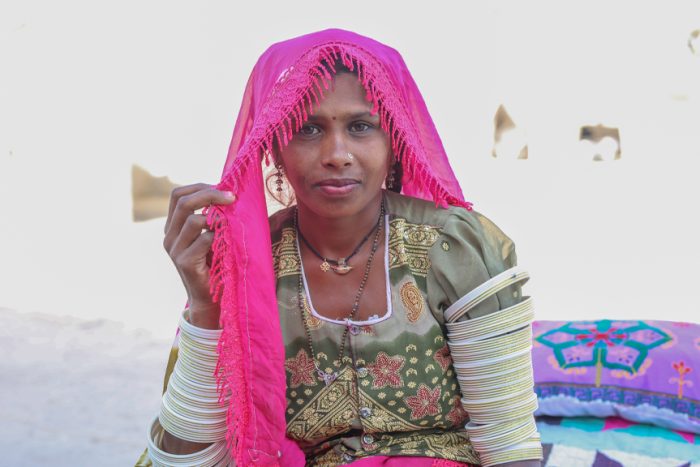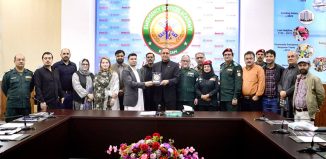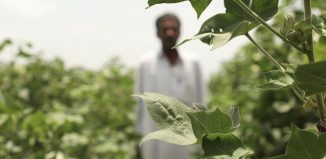Parsan, the Go-Getter
Parsan Kohli, a bright and articulate young woman from the village of Cheel Band, stands out for her clarity of thought and speech, particularly in Urdu—a language she proudly says she learned from her schoolteacher father. At twenty-five years old, she has already been married for a decade and is the mother of four children. In a community where having eight to ten children is the norm, her decision to limit the size of her family is notably uncommon.
Smiling, she shares that her husband, Moolchand, is one of fifteen siblings, while gesturing towards her mother-in-law who they live together with. “For all the hard work that woman has done, she looks wonderfully unscarred,” she remarks. With a large family to support, it is unsurprising that Moolchand never had the opportunity to pursue an education and now works as a bricklayer.
What sets Parsan apart is not just her decision to raise a smaller family, but the reasons behind it. As an active member of the Village Management Committee (VMC), established in 2022 under Community World Service Asia (CWSA) and Act for Peace’s(AfP) Health and Education project, Parsan has gained new perspectives on health, personal care, and family well-being. She reflects that, prior to her involvement with the VMC, she had limited understanding of basic hygiene and health issues. Like many others, she once believed that having more children was a way to secure the future. However, she now recognises that larger families often deepen the cycle of poverty. With this knowledge that she gained through the Health and Education Sessions held through the course of this project, she has become a vocal advocate for informed family planning within her village.
“But I had to begin with my own household,” she says. “I had to set an example before encouraging others to follow.” She recalls that it was once common in her village for women with infants as young as six or nine months to be pregnant again. Over the past two years, however, Parsan has played a key role in shifting this norm. She has supported nearly every woman in her para (neighbourhood) in adopting healthier spacing between children. The long-standing tradition of frequent, back-to-back pregnancies is now largely fading.
Her efforts particularly focus on newly married young women, to whom she gently explains the importance of waiting before expanding their families. Though she has not kept exact figures, Parsan believes at least thirty women have embraced her message, with ten of them committing to having smaller families. “They understand now that large families perpetuate poverty,” she says.
During her most recent pregnancy, Parsan experienced unusual discomfort. Remembering the health guidance sessions conducted by CWSA staff through the VMC, she visited the local Health Unit for a check-up. There, she discovered that her haemoglobin level had dropped to eight. She received treatment in time and went on to deliver a healthy baby. “Had I not attended those sessions, I would never have known. Who knows what could have happened,” she reflects.
Parsan sees her most significant achievement as her success in promoting girls’ education. Just two years ago, only twelve girls in her community were enrolled in school; today, that number has risen to thirty-five. Some of these girls are ten years old and only now entering grade one, underscoring how delayed school enrolment had become. She explains that girls’ education was often seen as unnecessary, with daughters expected to assist with domestic tasks. Even boys were sometimes kept home to fetch water while the older men idled. Going door to door, Parsan urged mothers to send their children to school, stressing that government schools do not charge tuition. “Your only expense is a few rupees for notebooks and pencils once every few months,” she told them.
Gradually, the number of enrolled children began to grow. With children now in school, Parsan notes that men have become responsible for fetching water, something that was once seen as children’s work.
The school in her neighbourhood, which serves approximately 200 households, now has four teachers. Two are funded by CWSA & AfP, one by the local community, and one by the government. Previously, families would often cite a lack of teachers as a reason not to send their children to school. That barrier, Parsan says with satisfaction, has now been removed.
Parsan is also deeply committed to preventing early marriage. “Fourteen is the usual age for marriage here, I myself was only fifteen,” she shares. Recently, she managed to delay the wedding of a sixteen-year-old girl through community engagement. The parents have now agreed to wait until their daughter turns eighteen. With so many accomplishments, what lies ahead for Parsan? She simply says she will continue. “Children are being born who need to be educated, and they must not marry until they are of legal age. I have to ensure that the right thing is done, that they stay in school and don’t marry before eighteen.”







